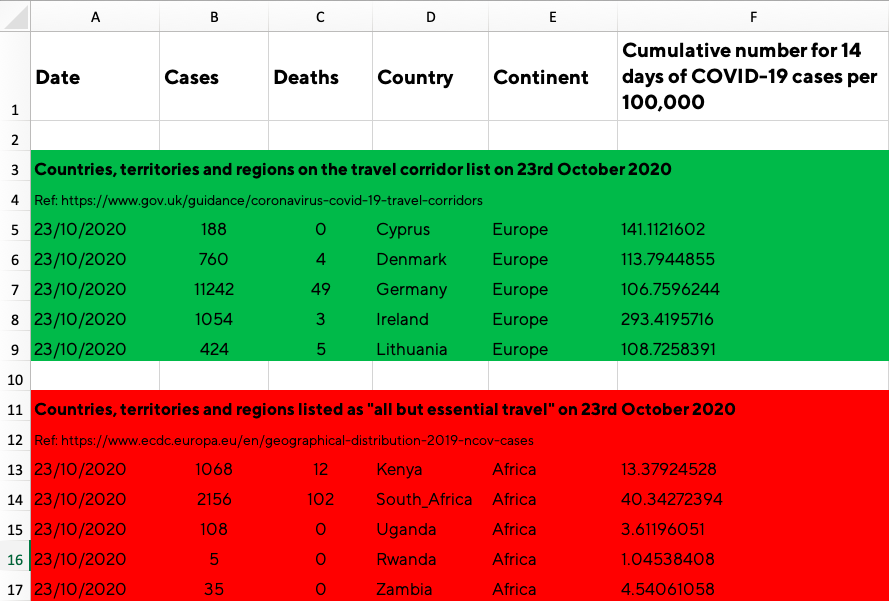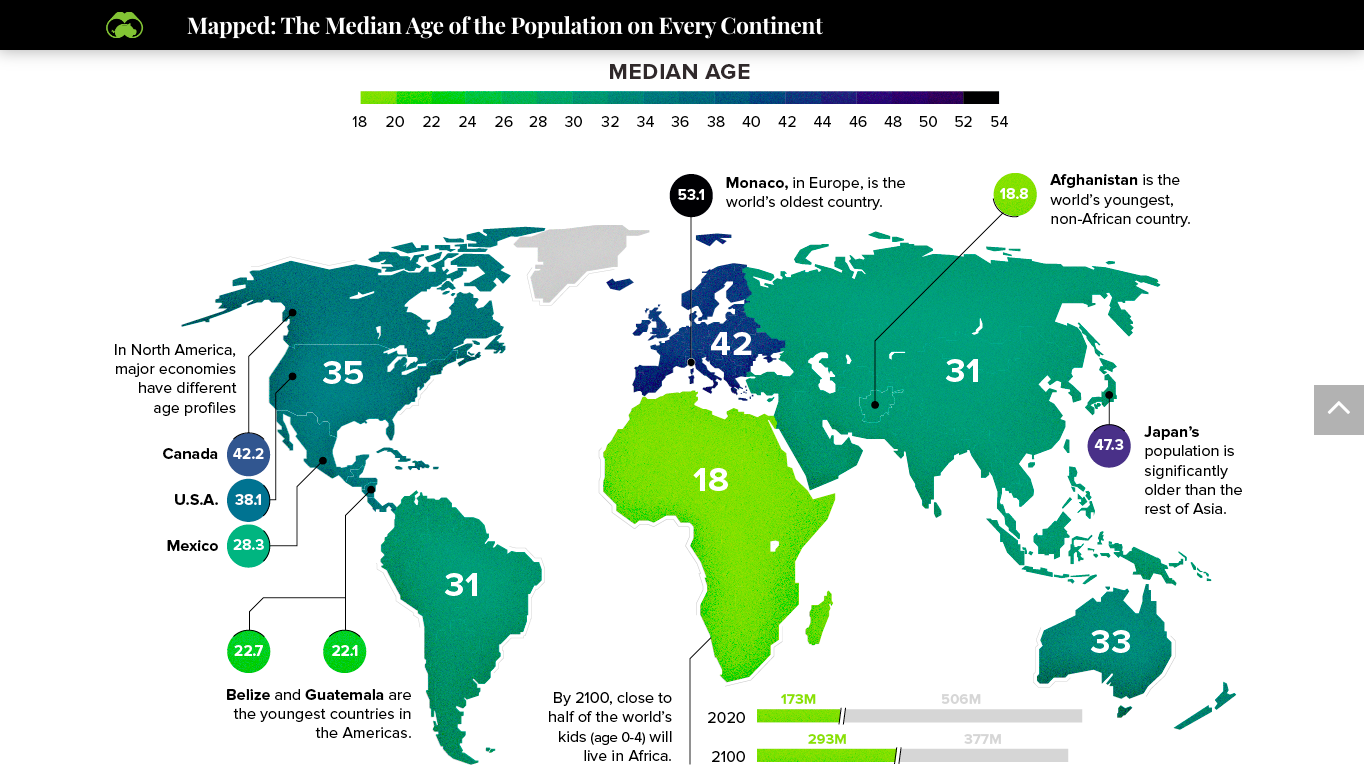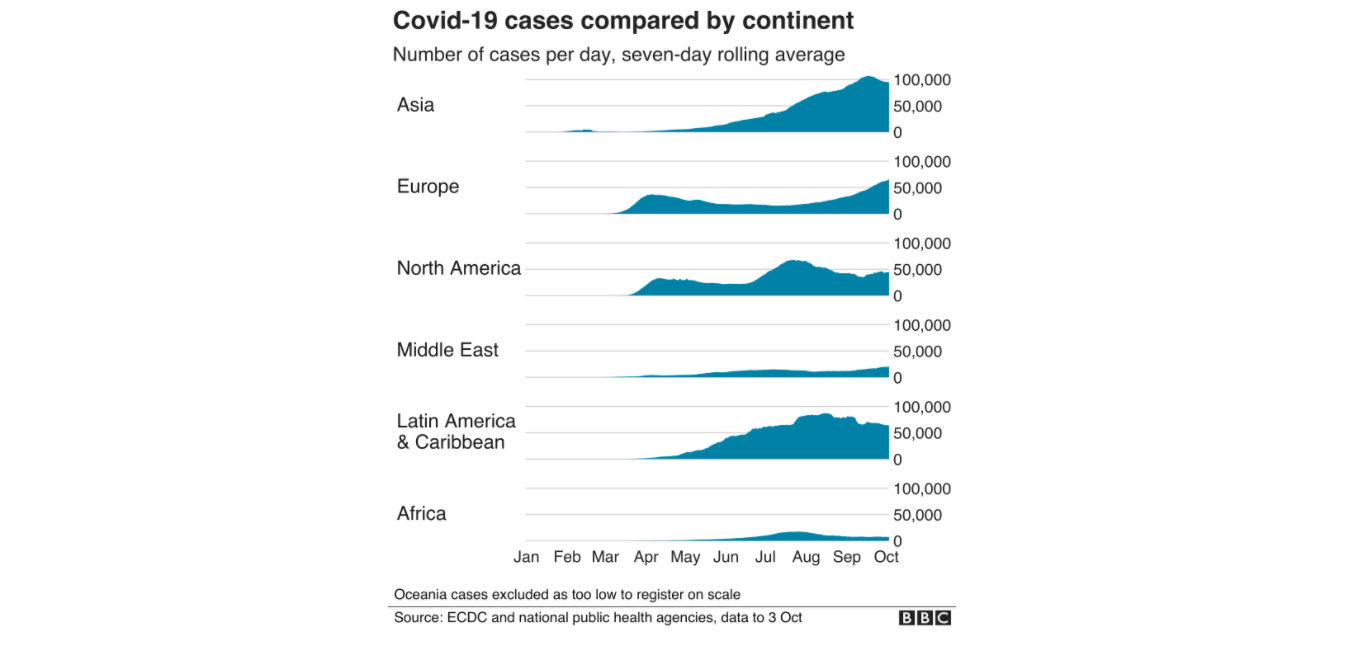The number of worldwide deaths related to Covid-19 has exceeded over 1 million.
At the time of writing, the cumulative number, for 14 days of Covid cases in the UK per 100,000, are 373.08 with a total of 44,437 deaths overall. Germany, Ireland and Denmark (are all which are on the travel corridor list) have rates of: 106.75, 293.41 and 113.79.
In Africa the cases are far less. Kenya for example, has 13.37 cases per 100,000 with a total of only 870 deaths overall, Rwanda's rate is 1.04 and Zambia's is 4.54, yet these countries, and every other African country for that matter, is listed as “all but essential travel”.
We have 2 questions:
- Why has Covid not hit Africa in the same capacity as other parts of the world?
- Why, with such low infection rates across the African continent, is there not a travel bridge available? (The table below shows updated covid data. Green = has a travel bridge in place. Red = no travel bridge in place)

Why has Covid not hit Africa in the same capacity as other parts of the world?
Young population
Covid favours the old and vulnerable, which is why countries with high ageing populations, such as the UK, have been hit hard. Africa has a young population - all but one of the 20 countries with the lowest median ages being from the continent. About 3% of the population are over the age of 65 years old.

Limited cross country transport
In comparison to many first world countries, the African continent has an underdeveloped transportation system. This makes it harder for people to travel between countries and across borders minimising contact and reducing the spread of the virus.
“We estimate that the SARS-CoV-2 pandemic peaked before the end of July 2020 in the major urban counties, with 34 - 41% of residents infected, and will peak elsewhere in the country within 2-3 months. Despite this penetration, reported severe cases and deaths are low. Our analysis suggests the COVID-19 disease burden in Kenya may be far less than initially feared.” – Sept 2020, Medrvix
Quick action
Many African governments were fearful of a new virus overwhelming their countries with relatively poor healthcare. They decided to take Covid seriously, with South Africa having one of the most stringent lock downs in the world. Some African countries acted even before their first cases were reported and many others went into a 3 week lockdown during April following the first reported case in Egypt in mid Feb.

Strong community health systems
It may come as a surprise but community health systems across the African continent are strong and well equipped. They are used to dealing with severe disease outbreak and illness on a regular basis. Health screening of one particular disease can quickly be extended for another – the system is already in place.
“Low testing rates continue to undermine the continental response however, there is no indication that a large number of Covid-19 deaths have been missed” - Dr John Nkengasong, the head of Africa Centres for Disease Control and Prevention.
Favourable climate
Covid prefers cold climates. The majority of Africa has a warm, hot and tropical climate. "We looked at the early spread [of the virus] in 50 cities around the world. The virus had an easier time spreading in lower temperatures and humidity,"- Mohammad Sajadi, lead researcher at University of Maryland US.
Why are there no air bridges between the UK and African countries?
In short, we just don’t know! Earlier this month ATTA launched a petition against the UK government urging supporters to put their signature to it - and famous faces are starting to get behind the campaign...
“With such low Covid infections, it seems discriminatory to not have any corridors to African countries from the UK. Health measures are extremely good in countries such as Kenya, Rwanda and South Africa, so it doesn’t make sense for Africa to be effectively cut off from the UK anymore.” - Former England cricketer Kevin Pietersen

"The British Government has chosen to boycott Africa where the UK is one of the largest providers of tourism. Its policy is having devastating effects on not only those directly employed in the tourism industry, but also the wider community whom tourists never see." - Nigel Vere Nicoll, FRGS, President of ATTA.
If you would like to read more or visit our references please see below:
Telegraph
Travel Weekly
Medrxiv
European Centre for Disease Prevention and Control


.jpg)

